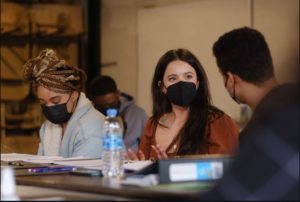
In the decade since graduating from the University of Arizona School of Theatre, Film & Television (TFTV), BFA Acting alumni Brenna DiStasio (‘15) and Paul Michael Thomson (‘15) have amassed impressive bodies of work across stage, screen, teaching, and playwriting. They have also brought to life a dream they’ve held since their TFTV years: they are the co-founders of The Story Theatre in Chicago, an adventurous storefront theatre dedicated to doing things differently.
This month, the Story Theatre was honored with the Broadway In Chicago 2025 Emerging Theatre Award, the annual award presented by the League of Chicago Theatres to recognize and promote young Chicago-based theatres demonstrating artistic excellence, innovation, and responsible business practices. The Story Theatre received the recognition for its commitment to artistic innovation, collective leadership, and radical imagination.
What were the reasons that compelled you to co-found The Story Theatre? When was it founded, and why Chicago?
 Brenna: Starting a theatre company had been a dream since we were still in the BFA Acting program at TFTV. I remember chatting with Paul Michael late one night after rehearsal. We sat in his car and dreamed up what we wanted our lives to look like post-grad. Starting a theatre company was one of those big dreams we knew we wanted but didn’t quite know how we’d do it.
Brenna: Starting a theatre company had been a dream since we were still in the BFA Acting program at TFTV. I remember chatting with Paul Michael late one night after rehearsal. We sat in his car and dreamed up what we wanted our lives to look like post-grad. Starting a theatre company was one of those big dreams we knew we wanted but didn’t quite know how we’d do it.
About a year after graduating and moving to Chicago, I was talking with Matt Bowdren (‘08), a fellow alum of the BFA Acting program, about the kind of theatre we loved and wished to create. We envisioned a place in the non-union scene that ran like an Equity company, was committed to increasing artist pay, and told stories in the way storefront theatres in Chicago do – by using the whole team’s creativity to make magic with little means. Matt was so excited by the idea and said we needed to start immediately – the three of us! So I called Paul Michael and told him we were getting started.
 Paul Michael: One of the reasons we moved to Chicago upon graduating was the city’s longstanding history of supporting new works and ensemble-based theatres. Of course, there are the legendary companies like Steppenwolf, Lookingglass, and Chicago Shakespeare Theatre – each started by a scrappy group of young artists, but there are also so many other theatres that inspired us whose origin stories have been lost: eta, Creative Arts Foundation; Kuumba Theatre; Free Street Theatre; Steep; Jackalope; Teatro Vista; and more. It has been an honor to enter into that conversation with The Story Theatre, offering a vision for what the next canon of great Chicago theatre can be.
Paul Michael: One of the reasons we moved to Chicago upon graduating was the city’s longstanding history of supporting new works and ensemble-based theatres. Of course, there are the legendary companies like Steppenwolf, Lookingglass, and Chicago Shakespeare Theatre – each started by a scrappy group of young artists, but there are also so many other theatres that inspired us whose origin stories have been lost: eta, Creative Arts Foundation; Kuumba Theatre; Free Street Theatre; Steep; Jackalope; Teatro Vista; and more. It has been an honor to enter into that conversation with The Story Theatre, offering a vision for what the next canon of great Chicago theatre can be.
We love to see that The Story Theatre is committed to cultivating the next generation of artists via an Emerging Playwright Residency Program, described as the “singular residency opportunity in the Chicago storefront scene.” As a result of the program, you recently produced a reimagining of your 2019 World Premiere of At the Wake of a Dead Drag Queen by Terry Guest, a play that critics praised for its emotional depth and strong performances. Tell us why supporting new playwrights is a priority.
Paul Michael: When we moved here, we were able to find the on-ramps to the acting careers we wanted fairly quickly. While it wasn’t easy, we found opportunities for auditions, classes, connections, and performance–whether that be through attending late-night industry showcases or early-morning EPAs [Equity Principal Auditions, for actors seeking leading roles in professional theater productions].
As a playwright, though, and an inexperienced one at that, I could not find the entry points in the same way. The literary managers I would meet with (if I could get a meeting) wanted to see the work on its feet, and no one wanted to be the company to produce an untested writer’s first ever production. So, we dedicated The Story to being a place that would do so. When we started The Story in 2018, the new play development frenzy that is so emblematic of pandemic-era theatrical production was not existent in the same way. We are proud to have been a champion for new works by emerging Chicago playwrights, to work with them to create productions that realize the fullest potential of their script at that given point. And the hope is that this residency is able to serve as a springboard for robust playwriting careers in Chicago and beyond!
The Story Theatre does things a little differently – in place of a traditional Artistic Director, the theatre is run by an Artistic Governing Ensemble. How does this work? What are the pros, and are there any cons?
Paul Michael: The Story takes the roles and responsibilities historically held by singular leaders in an institution and distributes their power and the labor required by those roles across a diverse group of artists. We have had as many as eight and as few as three co-leaders at a time. We are currently rocking with four Governing Ensemble members: Ayanna Bria Bakari; Brenna DiStasio; Terry Guest; and Paul Michael Thomson. Basically, think of running the company like a big group project! Now, is that some people’s nightmare? Absolutely! But, for us, we find that the collective vision is the one we are most excited to work towards. As theatre artists, we know the effectiveness and joy that comes from working in an ensemble. So, we are rehearsing the world we want to live in by running this company in a way we wish more institutions were run: collectively, collaboratively, and communally.
You both earned a BFA in Acting from the School of Theatre, Film & Television. In what ways do you each draw on your U of A training in your roles at Story?
Brenna: We were in the BFA when it was a cut-based program that required students to re-audition in their freshman and sophomore years. While challenging, I feel that that intense dynamic taught me the importance of self-discipline and that if I wanted to achieve my academic and personal goals, I needed systems of organization and prioritization. All of these skills are of course needed when starting a non-profit and building out a business, and I attribute these to my time at TFTV. Acting in and of itself requires you to be present, curious, and in a place of readiness to respond, which is a state of being the BFA instilled in me that keeps me a very active leader at The Story.
So much of what I draw from as an Artistic Director and Producer has been pulled from my time at TFTV. We were equal parts actors, students, directors, stage managers, and designers; we were required to be flexible at a moment’s notice to service the needs of the story we were telling and the artists we were telling it with. It taught me how to meditate, to show up as a ready participant for the time we had set aside, to leave ego at the door and be a true member of the group, and to be willing to stay longer to get the job done. That really feels like my work at The Story Theatre in a nutshell – to be able to lead and to follow, to be both director and student.

As well as co-founding the theatre, you continue to amass considerable stage and screen acting credits when you’re not playwriting, producing or educating. Versatility seems to have been key in each of your own multifaceted careers. What words of advice would you share with emerging theatre alumni coming up behind you?
Brenna: My biggest piece of advice for young artists is to cultivate your community. Of course this means the larger artistic community you are looking to work in, but most importantly, your immediate community. Find other actors who want to get up at 4am to go to an EPA with you, who will come over and note that self tape you’re working on, and who want to get a weekly coffee date to outline personal goals and send those resume emails off to casting directors. It is so much easier to do this work with a friend that you trust–whose taste matches yours and who is going to answer the phone when you did and didn’t book that guest star role. Paul and I have spent the last 14 years going to auditions, seeing shows and talking about them after, rehearsing monologues, going to rehearsal, and building our theatre, and it was all so much more joyful because we were doing it together.
Second, I would say do your homework. Take classes, keep your resume updated and sent out, go to those auditions instead of staying in bed, and memorize your lines. In a business where we get to control so little of what happens, it is incumbent upon you to control what you can control. Become the type of person who keeps the promises you make to yourself; a decade from now, you’ll be able to say you achieved the things you said you were going to.
Finally, your career is yours. This is a marathon, not a sprint. Go on that family vacation even if you’re scared of losing opportunities from booking out. Being a truly skilled artist demands that you live and experience your one beautiful life, and that life makes you a better actor. When you work from a place of abundance, making things that you love and are passionate about, the right people and work will come your way.
Paul Michael:
- Rejection is protection — the opportunities you do not receive often direct you towards the ones that are more aligned with your purpose
- Fake it until you become it — I saw this in a TedTalk in 2013, and it influenced the “I belong here” attitude I try to bring into every new space, even the ones that feel too fancy or cool for a little gay boy from Mesa, and
- In a world that will often tell you no, tell yourself yes — enthusiastically, repeatedly, often.
